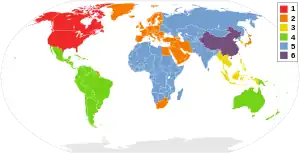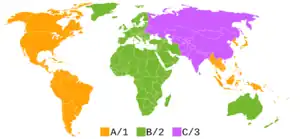Regional coding
digital system to prevent use of a product or service outside of a certain region or territory
Ever thought of buying a game or television programme not available in your home country when overseas? Ever learnt a foreign language and thought of buying a show in its original language when travelling in its country of origin? While these may sound attractive, it may get more complicated than it seems as many companies use regional coding, so a DVD bought overseas may not work on your DVD player.
The companies involved call this Digital Rights Management (DRM) and claim they are protecting the rights of copyright holders, "preventing piracy". In fact, though, region codes have no effect on piracy, if that is taken to mean illegal copying; a bit-for-bit copy of a disk will play just fine on any device where the original will.
Critics of DRM call it Digital Restrictions Management and claim that it protects no legitimate rights, only a cartel's aspirations for market control. For example, a French-language video game usually sells for a higher price in France than in Canada. Similarly, a movie may not be released on DVD in Australia for months after it becomes available in the US, and even then it will often be more expensive in Australia. Region codes are used to force customers to buy the higher-priced French game or Australian DVD, rather than importing cheaper versions. If the codes function as designed, then their devices will refuse to play an imported disk.

